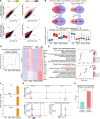Antiviral memory B cells exhibit enhanced innate immune response facilitated by epigenetic memory
- PMID: 38552009
- PMCID: PMC10980274
- DOI: 10.1126/sciadv.adk0858
Antiviral memory B cells exhibit enhanced innate immune response facilitated by epigenetic memory
Abstract
The long-lasting humoral immunity induced by viral infections or vaccinations depends on memory B cells with greatly increased affinity to viral antigens, which are evolved from germinal center (GC) responses. However, it is unclear whether antiviral memory B cells represent a distinct subset among the highly heterogeneous memory B cell population. Here, we examined memory B cells induced by a virus-mimicking antigen at both transcriptome and epigenetic levels and found unexpectedly that antiviral memory B cells exhibit an enhanced innate immune response, which appeared to be facilitated by the epigenetic memory that is established through the memory B cell development. In addition, T-bet is associated with the altered chromatin architecture and is required for the formation of the antiviral memory B cells. Thus, antiviral memory B cells are distinct from other GC-derived memory B cells in both physiological functions and epigenetic landmarks.
Figures






References
-
- Tarlinton D., Good-Jacobson K., Diversity among memory B cells: Origin, consequences, and utility. Science 341, 1205–1211 (2013). - PubMed
-
- Tangye S. G., Tarlinton D. M., Memory B cells: Effectors of long-lived immune responses. Eur. J. Immunol. 39, 2065–2075 (2009). - PubMed
-
- Weill J. C., Le Gallou S., Hao Y., Reynaud C. A., Multiple players in mouse B cell memory. Curr. Opin. Immunol. 25, 334–338 (2013). - PubMed
-
- Kurosaki T., Kometani K., Ise W., Memory B cells. Nat. Rev. Immunol. 15, 149–159 (2015). - PubMed
Publication types
MeSH terms
Substances
LinkOut - more resources
Full Text Sources
Molecular Biology Databases
Miscellaneous

